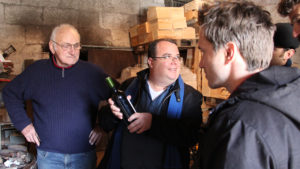Students study under Professor Zohar Kerem to learn about winemaking in Israel and beyond.
by Elyse Glickman
Over the last decade, the public’s perception of Israeli wine has shifted dramatically thanks to the success of both major and independent producers in upgrading their production processes while staying true to traditions and approaches as old as humankind. It’s notable that several Israeli wines have garnered top honors in major international competitions (including Vinitaly, Decanter, and C.D.V.) and earned stellar reviews in highly regarded wine journals (Golan Heights Winery was the first Israeli wine to receive Wine Enthusiast’s Prestigious “Wine Star” award in 2011).

However, Hebrew University of Jerusalem Professor Zohar Kerem, creator of the only winemaking program in Israel, says that to fully understand the evolution of the Israeli wine industry and its winemakers and growers, you have to go to the source—not just the grape varietals, but the soil where the vines are cultivated. The 20-month academic course launched in early 2017 is designed to take young Israeli winemakers to that source and provide the tools needed for their products to take a more prominent place on the world stage. Now that the program is producing its first graduates, and Kerem believes they will make up the generation that breaks Israeli wine into an even wider audience and level of appreciation.
“Israel is a mosaic of many growing zones, which are different in their composition of soil and climatic conditions,” says Kerem, affirming the Israeli wine industry is now moving precipitously towards maturation. Within that mosaic, there are more than 300 wineries (70 of them commercial), annual harvests of 60,000 tons of wine grapes, and 40 million bottles of wine produced annually. Other Israeli advantages include year-round sunshine and a geological mix of hills and mountainous areas with soils of limestone, terra rossa, and volcanic tuff. The Judean Foothills, Judean Hills, Upper Galilee, and Golan Heights are the fastest growing regions in terms of new vineyards being planted.
Kerem adds that many top-tier Israeli wines are crafted from Cabernet Sauvignon and Shiraz, or are Bordeaux-style blends, based on Cabernet Sauvignon with Merlot, Petit Verdot, and Cabernet Franc in supporting roles. The predominant whites are Sauvignon Blanc and Chardonnay, followed by Riesling, Gewurztraminer, and Viognier. Native Israeli varietals on the rise include Argaman (a cross of Carignan and Portuguese grape Souzao) and Emerald Riesling—a Riesling/Muscadelle hybrid created in California in 1948 that, until recently, only thrives in Israel used to make semi-dry wines.
“As viticulturists are now starting to stabilize their growing protocols, and vines at vineyards across the country are growing out from their childhood phase, this marks the beginning of a new era,” he continues. “With all the effort from Israel’s winemakers and growers alike, we finally have distinctive wines that are competitive with wines from the U.S., Australia, and Europe. However, we are only now beginning to characterize our uniqueness, and we start to establish tomorrow’s traditions today.”
Even with the successes over the last few years, Kerem observes that members of the still-growing Israeli wine industry separately and collectively need to push a little harder to definitively emerge from the “Kosher ghetto,” or as he puts it, go “out of the walls, and act in accord.”
“We see this as a vital part in the global emergence of the Israeli wine industry, and a must in the land where wines have been produced for over 5,000 years, evidenced by numerous archaeological finds,” Kerem explains. “Furthermore, it’s important to see how wines from other places grow to international prominence. An important part of our program is a tour of an ‘old-world’ wine production region, such as Bordeaux, during the fourth semester after they have acquired essential skills and knowledge. We stage concentrated workshops where students interact with the academic staff of the University of Bordeaux and visit the leading wineries of the region.”

Another goal of the program, according to Kerem, is to enable students to participate in international collaborations with leading wineries and programs in other countries. This is meant to ensure that the next generation of Israeli producers will come into their own with resources they will have acquired through their studies—bringing the Israeli industry up as their careers advance.
“The more a young producer knows about vines, soils, different approaches for wine production, and the economy and management of a winery, he or she will be all the more successful,” he says. “All of our graduates and those completing their studies are already integrating themselves into the Israeli wine industry. Their impact is already taking shape through new cultivars, new and individually produced yeast strains, agronomic practices changes, and more.”
